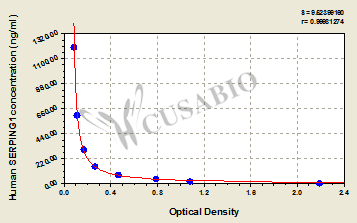SERPING1, also known as C1 inhibitor, is a serine protease inhibitor that regulates multiple proteolytic cascades including the complement, coagulation, fibrinolytic, and kallikrein-kinin systems. This protein serves as the primary inhibitor of C1r and C1s proteases in the classical complement pathway, preventing excessive complement activation and subsequent tissue damage. SERPING1 deficiency or dysfunction is associated with hereditary angioedema, a rare genetic disorder characterized by recurrent episodes of localized swelling. The protein's regulatory role in inflammatory pathways makes it a valuable biomarker for various immune-mediated conditions and complement-related disorders.
The Human Plasma protease C1 inhibitor ELISA kit (CSB-EL021086HU) uses a competitive quantitative assay principle to measure SERPING1 levels in serum, plasma, and tissue homogenates. The kit offers a detection range of 18.75 ng/mL to 1200 ng/mL with a sensitivity of 4.7 ng/mL. Each assay requires 50-100 μL sample volume and can be completed within 1-5 hours. Detection occurs at 450 nm wavelength, providing reliable quantification of human SERPING1 concentrations for research applications.
Application Examples
Note: The following application examples are drawn from a selection of publications citing this product. For additional applications, please refer to the full list of references in the "Citations" section.
This ELISA kit has been used in proteomics validation studies to confirm differentially expressed proteins identified through serum analysis. Researchers have applied the kit to quantify target protein levels in human serum samples as part of biomarker profiling studies. The assay serves as a validation tool for proteomic discoveries. It also supports studies examining protein expression changes in clinical research contexts.
• Proteomics validation: Confirmation of differentially expressed proteins identified through initial serum proteomics screening approaches
• Biomarker research: Quantitative measurement of target protein concentrations in human serum samples for biomarker development studies
• Complement system studies: Analysis of complement pathway components in serum samples to examine immune system function
• Clinical research: Comparative protein level analysis between patient groups and control populations in translational medicine studies






